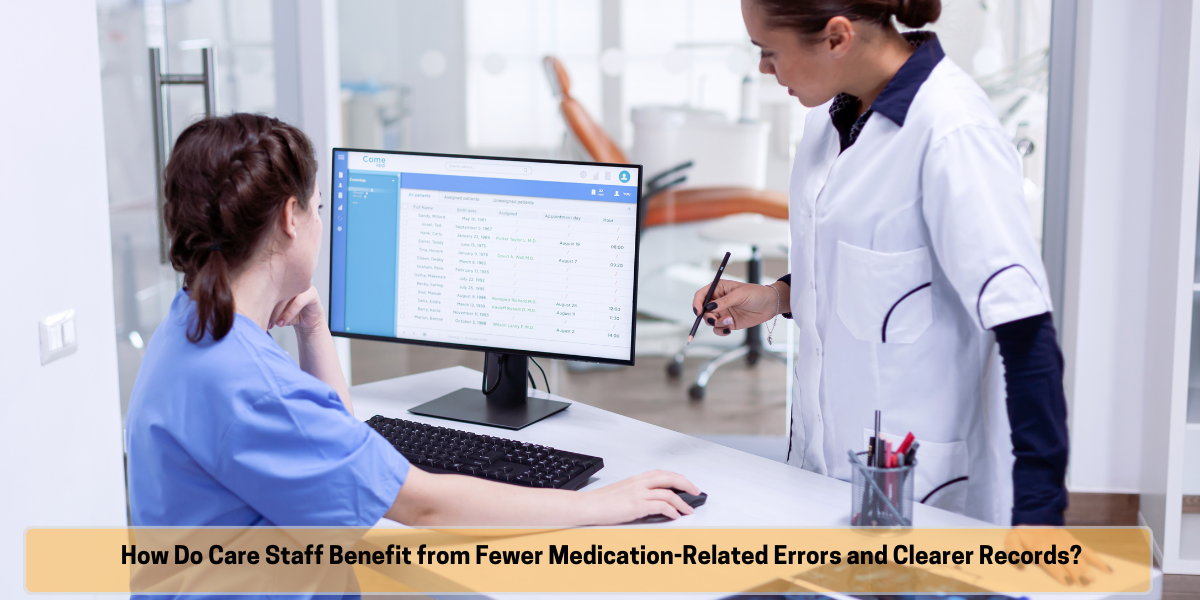Medication errors happen in UK healthcare. Wrong doses. Wrong medications. Missed doses. These mistakes can seriously harm patients. They also create enormous stress for care staff. Then there’s the problem of unclear records. Messy handwriting on paper charts. Missing information. Lost medication sheets. Care staff waste precious time trying to decipher what’s been written. They worry constantly about making mistakes because the information isn’t clear.
These two problems – medication errors and unclear records – make healthcare jobs incredibly stressful. Care staff lose sleep. They feel anxious during every shift. They worry about harming patients through no fault of their own.
Electronic Medication Administration Record (eMAR) systems are transforming healthcare across the UK. eMAR systems catch problems before they become serious. Unlike paper systems, staff know about issues immediately. No more discovering mistakes too late. The system gives real-time alerts that ease the constant worry about making mistakes.
Missed a dose? The system alerts staff instantly. About to give the wrong medication? There’s an alert before it happens. This instant feedback means quick fixes. Patients stay safe. Staff feel less stressed.
The automatic dose checking is brilliant. The system cross-checks prescribed doses against what’s being given. Any problem? It flags it straight away. No more worrying about unclear handwriting. No more calculation errors. The system provides that safety net. Staff can sleep better at night.
- Crystal-clear records eliminate medication errors and frustration
In many care environments, staff have long struggled with the challenges of paper-based MARs—deciphering unclear handwriting, second-guessing whether a dose says “2mg” or “12mg,” and wasting time searching for misplaced records. These moments can create unnecessary stress and compromise patient safety.
With electronic Medication Administration Record (eMAR) systems, all records are digital—clear, legible, and accessible in one centralised location. No more flipping through folders or chasing missing paperwork, especially during busy shifts when every second counts.
This streamlined access to accurate information helps reduce stress and improve workflow. Staff gain confidence knowing they have immediate visibility of each patient’s medication history. The result: safer care delivery, improved efficiency, and a more controlled working environment.
- Better patient safety brings peace of mind
Patient safety is the top priority. eMAR systems give care staff powerful tools to protect patients. They also reduce the psychological burden of constant worry. Real-time tracking means staff can spot errors immediately. They can fix them before harm occurs. No more sleepless nights wondering if everything was done correctly. The system keeps a complete, up-to-date medication history for each patient. This helps staff spot patterns quickly. If a patient isn’t responding well to medication, staff can act fast. They have reliable information backing their decisions.
- Smoother workflow reduces pressure
Time pressure is one of the biggest stress factors in healthcare. eMAR systems help staff make the most of their shifts. Much of the record-keeping becomes automatic. When medications are given, the system updates the patient’s record instantly. Less time on paperwork. More time for actual patient care. No more overwhelming feeling of never having enough time. Many eMAR systems work on smartphones and tablets. Staff can update records on the go. No need to return to a computer or desk. Information can be entered instantly. This keeps everything accurate. It prevents the stress that comes from falling behind on documentation.
- Less stress
The responsibility of ensuring residents get the correct medication is incredibly stressful. The fear of making a mistake weighs heavily on care staff minds. That mistake could harm someone. But with eMAR systems, staff can approach their tasks with confidence. Much less anxiety.
The system cross-checks medications in real-time. It flags potential issues. Staff don’t have to rely on memory. They don’t have to decipher illegible handwriting. They can trust the system. It helps ensure the right medication is given at the right time. Staff can focus on excellent patient care. Not constantly worry about mistakes. This confidence doesn’t just reduce stress. It helps staff feel empowered. Less burnt out. They’re still skilled professionals making decisions. But now technology works alongside them. It prevents errors. It provides peace of mind.
- Better communication leads to improved confidence
Poor communication between healthcare team members causes major stress and anxiety. With eMAR systems, everyone has access to the same real-time patient information. Nurses. Doctors. Care assistants. No more panic from working with outdated or unclear information.
When a doctor prescribes new medication, nursing staff see the change immediately. They can adjust the patient’s care plan accordingly. This smooth communication improves care coordination. Treatment plans stay aligned across different healthcare providers. Less stress from uncertainty and miscommunication.
- Simple reporting eliminates audit anxiety
eMAR systems automatically generate reports. They create comprehensive audit trails. This makes tracking easy. Reviewing medication administration over time becomes simple. Issues can be addressed quickly. No panic when requests come in.
When regulatory inspections and audits arrive, staff are prepared. No usual stress and scrambling. The system maintains accurate, organised records. Demonstrating compliance becomes straightforward. This transparency maintains accountability. It keeps patient safety at the forefront. Staff stay calm during inspection periods.
Perhaps most importantly, eMAR systems tackle the biggest source of stress in healthcare. The constant fear of making a medication error. The psychological weight is enormous. Knowing that a single mistake could seriously harm someone creates chronic stress. It affects job satisfaction. It affects sleep. It affects overall wellbeing.







